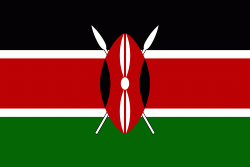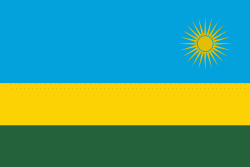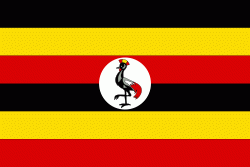Swahili language
Swahili, also known by its local name Kiswahili, is the native language of the Swahili people, who are found primarily in Tanzania, Kenya and Mozambique (along the East African coast and adjacent litoral islands). It is a Bantu language, though Swahili has borrowed a number of words from foreign languages, particularly Arabic and Persian, but also words from Portuguese, English and German. Around forty percent of Swahili vocabulary consists of Arabic loanwords, including the name of the language (سَوَاحِلي sawāḥilī, a plural adjectival form of an Arabic word meaning 'of the coast'). The loanwords date from the era of contact between Arab slave traders and the Bantu inhabitants of the east coast of Africa, which was also the time period when Swahili emerged as a lingua franca in the region. The number of Swahili speakers, be they native or second-language speakers, is estimated to be around million.
Due to concerted efforts by the government of Tanzania, Swahili is one of three official languages (the others being English and French) of the East African Community (EAC) countries, namely Burundi, Democratic Republic of Congo, Kenya, Rwanda, South Sudan, Tanzania, and Uganda. It is a lingua franca of other areas in the African Great Lakes region and East and Southern Africa, including some parts of the Democratic Republic of the Congo (DRC), Malawi, Mozambique, the southern tip of Somalia, and Zambia. Swahili is also one of the working languages of the African Union and of the Southern African Development Community. The East African Community created an institution called the East African Kiswahili Commission (EACK) which began operations in 2015. The institution currently serves as the leading body for promoting the language in the East African region, as well as for coordinating its development and usage for regional integration and sustainable development. In recent years South Africa, Botswana, Namibia, Ethiopia, and South Sudan have begun offering Swahili as a subject in schools or have developed plans to do so.
Shikomor (or Comorian), an official language in Comoros and also spoken in Mayotte (Shimaore), is closely related to Swahili and is sometimes considered a dialect of Swahili, although other authorities consider it a distinct language. In 2022, based on Swahili's growth as a prominent international language, the United Nations declared Swahili Language Day as 7 July to commemorate the date that Julius Nyerere adopted Swahili as a unifying language for African independence struggles.
Swahili is a Bantu language of the Sabaki branch. In Guthrie's geographic classification, Swahili is in Bantu zone G, whereas the other Sabaki languages are in zone E70, commonly under the name Nyika. Historical linguists consider the Arabic influence on Swahili to be significant, since it takes around 40% of its vocabulary directly from Arabic, and was initially spread by Arab slave traders along East Africa's coast.
Due to concerted efforts by the government of Tanzania, Swahili is one of three official languages (the others being English and French) of the East African Community (EAC) countries, namely Burundi, Democratic Republic of Congo, Kenya, Rwanda, South Sudan, Tanzania, and Uganda. It is a lingua franca of other areas in the African Great Lakes region and East and Southern Africa, including some parts of the Democratic Republic of the Congo (DRC), Malawi, Mozambique, the southern tip of Somalia, and Zambia. Swahili is also one of the working languages of the African Union and of the Southern African Development Community. The East African Community created an institution called the East African Kiswahili Commission (EACK) which began operations in 2015. The institution currently serves as the leading body for promoting the language in the East African region, as well as for coordinating its development and usage for regional integration and sustainable development. In recent years South Africa, Botswana, Namibia, Ethiopia, and South Sudan have begun offering Swahili as a subject in schools or have developed plans to do so.
Shikomor (or Comorian), an official language in Comoros and also spoken in Mayotte (Shimaore), is closely related to Swahili and is sometimes considered a dialect of Swahili, although other authorities consider it a distinct language. In 2022, based on Swahili's growth as a prominent international language, the United Nations declared Swahili Language Day as 7 July to commemorate the date that Julius Nyerere adopted Swahili as a unifying language for African independence struggles.
Swahili is a Bantu language of the Sabaki branch. In Guthrie's geographic classification, Swahili is in Bantu zone G, whereas the other Sabaki languages are in zone E70, commonly under the name Nyika. Historical linguists consider the Arabic influence on Swahili to be significant, since it takes around 40% of its vocabulary directly from Arabic, and was initially spread by Arab slave traders along East Africa's coast.
Country
-
Kenya
Kenya, officially the Republic of Kenya (Jamhuri ya Kenya), is a country in East Africa. With a population of more than 47.6 million in the 2019 census, Kenya is the 27th most populous country in the world and 7th most populous in Africa. Kenya's capital and largest city is Nairobi, while its oldest, currently second largest city, and first capital is the coastal city of Mombasa. Kisumu City is the third-largest city and also an inland port on Lake Victoria. As of 2020, Kenya is the third-largest economy in sub-Saharan Africa after Nigeria and South Africa. Kenya is bordered by South Sudan to the northwest, Ethiopia to the north, Somalia to the east, Uganda to the west, Tanzania to the south, and the Indian Ocean to the southeast. Its geography, climate and population vary widely, ranging from cold snow-capped mountaintops (Batian, Nelion and Point Lenana on Mount Kenya) with vast surrounding forests, wildlife and fertile agricultural regions to temperate climates in western and rift valley counties and dry less fertile arid and semi-arid areas and absolute deserts (Chalbi Desert and Nyiri Desert).
Kenya's earliest inhabitants were hunter-gatherers, like the present-day Hadza people. According to archaeological dating of associated artifacts and skeletal material, Cushitic speakers first settled in Kenya's lowlands between 3,200 and 1,300 BC, a phase known as the Lowland Savanna Pastoral Neolithic. Nilotic-speaking pastoralists (ancestral to Kenya's Nilotic speakers) began migrating from present-day South Sudan into Kenya around 500 BC. Bantu people settled at the coast and the interior between 250 BC and 500 AD. European contact began in 1500 AD with the Portuguese Empire, and effective colonisation of Kenya began in the 19th century during the European exploration of the interior. Modern-day Kenya emerged from a protectorate established by the British Empire in 1895 and the subsequent Kenya Colony, which began in 1920. Numerous disputes between the UK and the colony led to the Mau Mau revolution, which began in 1952, and the declaration of independence in 1963. After independence, Kenya remained a member of the Commonwealth of Nations. The current constitution was adopted in 2010 and replaced the 1963 independence constitution. -
Rwanda
Rwanda (u Rwanda ), officially the Republic of Rwanda, is a landlocked country in the Great Rift Valley of Central Africa, where the African Great Lakes region and Southeast Africa converge. Located a few degrees south of the Equator, Rwanda is bordered by Uganda, Tanzania, Burundi, and the Democratic Republic of the Congo. It is highly elevated, giving it the soubriquet "land of a thousand hills", with its geography dominated by mountains in the west and savanna to the southeast, with numerous lakes throughout the country. The climate is temperate to subtropical, with two rainy seasons and two dry seasons each year. It is the most densely populated mainland African country; among countries larger than 10,000 km2, it is the fifth most densely populated country in the world. Its capital and largest city Kigali.
Hunter-gatherers settled the territory in the Stone and Iron Ages, followed later by Bantu peoples. The population coalesced first into clans, and then, into kingdoms. In the 15th century, one kingdom, under King Gihanga, managed to incorporate several of its close neighbor territories establishing the Kingdom of Rwanda. The Kingdom of Rwanda dominated from the mid-eighteen century, with the Tutsi kings conquering others militarily, centralising power, and enacting anti-Hutu policies. In 1897, Germany colonized Rwanda as part of German East Africa, followed by Belgium, which took control in 1916 during World War I. Both European nations ruled through the Rwandan king and perpetuated a pro-Tutsi policy. The Hutu population revolted in 1959. They massacred numerous Tutsi and ultimately established an independent, Hutu-dominated republic in 1962 led by President Grégoire Kayibanda. A 1973 military coup overthrew Kayibanda and brought Juvénal Habyarimana to power, who retained the pro-Hutu policy. The Tutsi-led Rwandan Patriotic Front (RPF) launched a civil war in 1990. Habyarimana was assassinated in April 1994. Social tensions erupted in the Rwandan genocide that span of one hundred days. The RPF ended the genocide with a military victory in July 1994. -
Uganda
Uganda (Yuganda in Ugandan languages), officially the Republic of Uganda (Jamhuri ya Uganda ), is a landlocked country in East Africa. The country is bordered to the east by Kenya, to the north by South Sudan, to the west by the Democratic Republic of the Congo, to the south-west by Rwanda, and to the south by Tanzania. The southern part of the country includes a substantial portion of Lake Victoria, shared with Kenya and Tanzania. Uganda is in the African Great Lakes region, lies within the Nile basin, and has a varied but a generally modified equatorial climate. It has a population of around 49.6 million, of which 8.5 million live in the capital and largest city of Kampala.
Uganda is named after the Buganda kingdom, which encompasses a large portion of the south of the country, including the capital Kampala and whose language Luganda is widely spoken throughout the country. From 1894, the area was ruled as a protectorate by the United Kingdom, which established administrative law across the territory. Uganda gained independence from the UK on 9 October 1962. The period since then has been marked by violent conflicts, including an eight-year-long military dictatorship led by Idi Amin.
